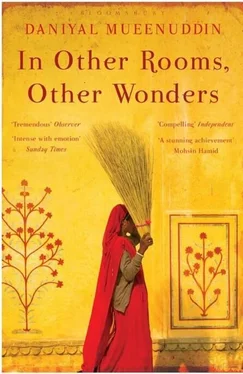Ghulam Rasool had an encyclopedic knowledge of his master’s friends, their power, their wealth, and he took great pride in these connections. When he saw Omar Bukhari, the son of the inspector general of police, arrive at the party, he had sent a gardener to fetch Rezak and told him to wait in the kitchen.
‘If Bukhari Sahib would speak to the police in Murree …’
She went into the living room and found Bukhari looming over a French girl, who had come with someone else, insisting that she must let him arrange a trip into the tribal areas of the frontier, which were off-limits to foreigners.
‘Really, Delphine — you should go, it’s amazing, and you’ll never have the chance otherwise,’ said the hostess. ‘Omar, can I pull you away for a moment?’
Bukhari followed her to the candlelit dining room. ‘So, Ghulam Rasool Sahib, what’s going on?’ The Harounis’ friends all knew Ghulam Rasool and joked that he had more power than many federal ministers.
Ghulam Rasool explained, emphasizing the girl’s attractiveness to make it seem like an abduction by one of the gangs who kidnap or buy women for prostitution — a scenario in which the police could help, since these things generally happened under their protection and they received a cut of the take.
‘We’ll break the bastards’ legs when we catch them,’ said Bukhari, who had been drinking quite heavily. ‘Go fetch the husband.’
Rezak came in, trembling, and couldn’t explain himself, but stood with a grief-stricken face, expectant, as if his wife might there and then materialize through the power of this important Sahib.
Bukhari had dealt with many cases of missing women, and knew that the family was almost always involved. He fixed Rezak with a hard gaze. ‘Who took her? The father? Did the family take her back?’
‘Only God above in His mercy knows, sir — I came home one night and she had gone, I couldn’t find her, sir. I’m an old man, I’m nothing.’
Recalling the presence of his hostess, Bukhari relented. Flipping open his tiny cell phone, he punched a number.
‘Get me the D.S.P. Murree.’ After a moment, a voice came on the line. ‘Hello, Qazmi, how are you? This is Omar Bukhari. Yes, everything’s fine. I’m in Kalapani, at the house of Mr. Sohail Harouni. The wife of one of his servants has been abducted. I want her back by tomorrow night … yes … no, come to the house in the morning and take down the details. I want you personally to handle this.’ Without saying goodbye he snapped shut the phone.
He smiled at Sonya. ‘Done.’
Rezak, who understood none of the conversation, which had been conducted in English, crouched and touched Bukhari’s knee with both hands, began to speak and then fell silent, bowing his head. Ghulam Rasool raised him up by the arm and led him away.
In the morning the Deputy Superintendent of Police himself showed up at the house, in his official jeep, flying a police flag, and accompanied by a pickup full of policemen carrying beat-up rifles. Unfortunately, the Harounis and all the guests had already left for Islamabad. The D.S.P. sat on a chair placed in the middle of the hall, with the quivering staff lined up in front of him.
‘Where’s the husband?’
Ghulam Rasool, the only one not perturbed by this policeman with stars on his shoulders, explained that Rezak lived at another property, down the road.
‘Get him.’
Rezak came in, breathless, led by a policeman.
‘So, old man,’ the D.S.P. stated, ‘they tell me your wife has run away.’ He began asking questions, in a low voice. At first he spoke gently, but his tone soon became irritated.
‘What you’re saying is, her parents sold her to you. Where did you get that much money?’
Ghulam Rasool stepped forward. ‘Sir, she’s not well in the head, this man took her from kindness as much as anything. And then, our Sahib is very good to us, he gives us everything we need and more.’
‘Women don’t just fly away on their own. Either this man knows something about it or she’s in Karachi by now. The best thing is for him to be quiet.’
The D.S.P. looked intently at Rezak for a moment, clasping his hands on his stomach, then stood up.
‘Please give my regards to Harouni Sahib,’ he said to Ghulam Rasool, speaking politely and almost formally. ‘I am always at his service.’ He begged off taking a cup of tea, claiming that he had an appointment.
Watching the policeman and his escort drive off, Ghulam Rasool said to Rezak, ‘Better stay out of the bazaar for a couple of days. He seemed like a pretty rude character.’
Just after dusk, four policemen in an unmarked car picked up Rezak from his orchard and took him to the police post at Tret, twenty kilometers down the road.
‘Did you find her?’ he had asked, when they came to his cubicle.
The youngest policeman, the only one in uniform, said, ‘Yes, yes, don’t worry.’
But he grabbed Rezak by the shoulder, took his arms, and handcuffed him. Rezak said nothing more, and allowed them to do as they liked.
Only when they put him in the back of the car did Rezak ask, ‘But what have I done? Where are you taking me?’
‘Shut up, Baba,’ said the young policeman, who up until then had been quite gentle.
They walked him into a windowless room in the police station and hung him up on a hook by the manacles around his wrists, so that his feet touched the ground only when he stood on his toes.
He hung on the wall all evening, long past the time when it seemed possible that the excruciating pain in his shoulders and back could be borne. In the next room policemen came and went but he was no longer aware of them.
At one point a policeman who had just come in from outside asked, ‘Who’s he?’
‘No idea. The D.S.P.’s guys sent him in. Strip, polish, and paint, I suppose.’
‘Ah,’said the newcomer. He went out, singing, ‘The night is made for lovers …’
After midnight a large man wearing civilian clothes came into the room. Two uniformed policemen came behind him and shut the door.
‘All right, let’s see,’ said the big man. ‘So, what’s your name?’
‘Mohammed Rezak, sir.’ He began weeping and blubbering. ‘I beg you, I’ve done nothing, I’m innocent, and now you’ve hung me up here. I beg you, remember, there’s a God above who judges everything …’
The large man became suddenly angry. ‘I see,’ he said menacingly, gritting his teeth. ‘I’m the one who’s being judged? It’s my fault, is it, I’m the one who’s guilty?’ He slapped Rezak with all his strength. ‘Where’s your wife, you bastard? I know all about it. Nobody took her — you sold her down the road, you pimp, and now you’ll tell me who to and when and for how much.’ He walked to the opposite wall and back, then came up and looked closely into Rezak’s face. ‘Or perhaps you killed her? She didn’t have children? You bought a lemon? Ready for a new one, moneybags?’
He slapped Rezak again, cutting his lip. ‘You listen to me, I can make you fuck your own daughter if I want to, you’ll hump her all night, like a dog fucking a bitch.’
‘For God’s sake, for God’s mercy, I don’t have a daughter, sir …’
‘You’re really trying to piss me off, aren’t you?’ And then, to one of the men, ‘Take him down.’
The two uniformed policemen lifted Rezak off the hook and threw him to the ground. Rubbing his hands together, the big man looked down at Rezak appraisingly, as if considering his next move.
‘Stretch him out and bring me the strap.’
They pulled down his shalvar, carried him to a bench, and stretched him on it, one pulling his arms and one pulling his feet. They had removed his kurta when they hung him up on the wall.
Читать дальше












